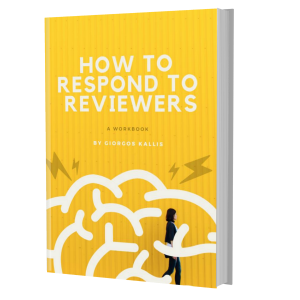Answering your Questions
Since I launched the blog, many of you have emailed me with questions. Thank you! Here are some brief answers. I want to share these with everybody, since many others might have the same questions. If you want to ask me something, do not hesitate to email at info@howtowriteanacademicpaper.com - I will be responding to questions periodically in blogposts such as this!
Panagiota asks: How do you write a literature review that is not boring and that enhances your argument, highlighting the value of your article?
Giorgos answers: I will dedicate a future post on writing a literature review. For the time being, and to address the specific question of boredom: if you don’t want to bore your readers, then don’t be bored yourself! If you are excited about your topic, this will spill over to the paper. If you are excited about the topic, then you should be excited about what you have read and what others before you have written – in academic jargon ‘the literature review’. If on the other hand, you treat the literature review as a mere section of the paper and a chore that must be done before you move on to the most important part that is your results, then this will show and will be boring indeed.
How can you make the review interesting? By presenting the literature as a series of unsolved puzzles - questions that people have struggled with, and to which your paper will try to give an answer. The clearer and the more provokingly you frame these questions, the more you will intrigue your reader, and the more you will lay the ground for your contribution, the value of which will start to become apparent.
Think of it as a detective novel, which starts with the ‘crime’ and the puzzles that have to be solved if we are to find who the murderer is. What do we know about the murder already from others? Say you are studying the health impacts of climate change. What do we know about the scale of the impacts? What do we not know and why? Who has grappled with these questions before you, how have they done it, and why are you not fully satisfied with their answers? Frame your literature review as a fight, a fight with successes and failures in our effort to advance collective knowledge. And tell us what you are bringing in the fight.
Elena asks: What about the “highlights” section. They are not a title, not a subtitle, not an abstract. I always feel frustrated with highlights. I have to do them at the end of the submission, when I am usually bored of my own stuff. Do you have any tips for writing good highlights?
Giorgos answers: I am afraid no, because I hate highlights as well, Elena. You are not alone in this. Fortunately, I think only Elsevier journals ask for highlights. I haven’t been convinced of their utility. I never read highlights, and whenever I do, I don’t understand what the heck the article they are highlighting is about. I always have to look at the abstract, which has a narrative. Maybe highlights work for natural science papers, where you can telegraphically report on some key findings or results. But for a social science paper where you may have applied a complex theory to make sense of a grounded phenomenon, arriving at nuanced and conditional results, it is next to impossible to try and summarize all of this in to 20-word sound bites. Highlights like ‘This paper applies X theory to the study of Y empirical case” are utterly useless in my view, but so it goes, Elsevier asks for it, and the robot on the other side of the line won’t let you submit unless you give it highlights.
My two cents: don’t worry so much about the highlights. No reviewer will judge your paper on the basis of highlights and no scholar will read the highlights of your published article and stay there. If you want to do a good job, nonetheless, then try to summarize the core messages of your paper, as if you were a politician giving slogans to the audience or a scientist giving a Ted talk (I am not sure these examples motivate anyone…). And don’t focus on what you did (‘This paper applies method X’), but on what you found (‘Theory Y is not useful for explaining rise of movement Z’).
Sam asks: What suggestions do you have for getting published papers with politically radical arguments -- for example calling for degrowth or non-capitalist futures -- in journals that skew toward mainstream, "de-politicized" science?
Giorgos answers: A paper with a radical message does not automatically disqualify it from being published in a mainstream journal. There will be many filters before that may make your research not appropriate for a journal. For example, it can be that the type of questions you are using or the methods you are applying are not of the type published in the journal. Or the language you are using may be different. For example, to publish in a top journal of economics, you should speak the language of a formal mathematical model (typically of the optimization-equilibrium type), and test it with an econometric regression of a particular sort that the discipline has come to consider acceptable (not to mention that you should be in an economics department in one of the top programs). To publish as a social scientist in a Nature journal, you will need to have one way or the other, a quantitative study, natural scientists are not used to the methodology or epistemology of qualitative research. If you are a social scientist working on a case study with interviews, or deconstructing the discourse of certain policy texts with content analysis, it is next to impossible to publish in these journals, independent of how political or radical, your messages are.
You are right that being open about your ‘politics’, or the political implications of your research might not work well in journals where scientists have been disciplined not to see the political assumptions and implications of their research, and are trained to hide them behind seemingly technocratic and ‘objective’ or neutral language. Of course, as long as your claims support the status quo, then you can claim that you are impartial and neutral – no one will question you if you propose a carbon market. The moment you come up with conclusions that have inconvenient implications, say degrowth, then you are vulnerable to the criticism that you are ‘political’ or ‘ideological’. But I want to believe that if you know the rules of the game, and the language of the community you want to speak to, then you can find the way to present empirical findings that have radical political implications while respecting the seemingly apolitical norms of that community.
Piketty did it for economics – he spoke the technocratic language of his discipline and rocked it with his findings about inequality and his policy proposals for a global wealth tax. Of course, there is somewhat of a Catch-22 situation in this, in order to speak the language and be accepted in a mainstream community you have to clean your head of radical ideas when young, and then by the time you are an accomplished researcher your research is already too sanitized to have any radical implications. Not everyone is a child prodigy like Piketty, or can wait to get a Nobel prize like Joseph Stiglitz, and then start talking against the policies he was advocating as a youngster.
In Nature journals, it is not as bad as with economics. You can’t of course write a conceptual paper, or an opinion piece that calls for post-capitalist futures, nor can you do a case study of a cooperative or an environmental conflict and draw qualitative conclusions. They want numbers and graphs, too many words confuse natural scientists. You will have to do something within the standards and approaches publishable in these journals and let the radical implications speak for themselves. A good example is Dan O’Neill’s and colleagues’ piece on a good life within planetary boundaries.
Irina comments: writing is important but perhaps more important is also to 'unlearn' writing according to the strict rules of business academia. I love writing (especially literature and philosophy), it's the more 'scientific' way of writing that feels a bit constraining to me.
Giorgos ponders: The scientific language can be quite constraining and the standardized format of journals even more so. If you are a natural scientist, you have to write this way for academic journals. But note how many good scientists have written wonderful non-fiction books, where they have communicated their work to different publics in more direct or emotional ways. If you are a social scientist (and I know that you are Irina), then there are journals that are open to undisciplined ways of writing, which can be closer to literature or philosophy. In Geography for example, there is the critical journal Antipode.
Diana asks about citing: How do I cite people in cases that there are many that have said the same thing? And is it ok to put long quotes from the work of someone else?
Giorgos answers: Yes, it is ok to put long quotes, but not more than 1-2 times from the same person in one article (unless this article is engaging explicitly with the work of that person). Note also that the quote should really add to your argument, it shouldn't be there to free you from the trouble of having to write something yourself. And if you can summarize it in your own words, then do it – use the quote only when the liveliness of the original text, or the way someone said something, will have a unique impact on the reader. Do not quote directly something that is trivial.
About multiple citations: normally people do not say the same exact thing (only when we understand something superficially, we think everyone says the same). It is generally a bad practice to have a very specific statement attributed to many studies, but it might be the case that in some cases this is justified (e.g. three studies finding the same statistical relation say between GDP and carbon emissions). It is fine also if the statement you are citing is quite general (e.g. ‘Before us, others applied the Q-method to the study of vegetarianism - see Smith et al, 1999, Harvey, 2007 and Cardenas-Ruiz, 2003)’). But you want to be careful not to have too many generic statements such as this in your review. The readers want specific claims about the findings or questions of specific studies – they want you to summarize research for them, not to give them general information that will be practically useless and they will immediately forget it. Be aware of the danger of over-generalizing – many times I have gotten upset as a reviewer when I see my work packaged in a joint citation together with other studies from which I think it differs a lot, just to support a trivial statement that does not need to cite a study.
Carmen Amelia asks: What type of platforms can make writing easier? How do you keep your references? If English is not your native language, should you write directly in English or hire a translator?
Giorgos has no clue: I am not using any platform Carmen, just the good old pencil and eraser. O.k. I am joking, I have adapted to the modern times and use the platform of a personal computer with a word processor. But that’s more or less it. In the past I have used Endnote to manage my bibliography and many of my students use Zotero. I gave up as I often collaborate with authors who do not use these (or use other) software and then it becomes difficult to change or sync the references. I retrieve citations quite easily from google-scholar, and manually copy and paste the citation they offer (you can do this by pressing the “quotation marks” below the paper).
If your English is very poor, and this is your first paper, under some exceptional circumstances it might make sense to write it in your native language and have it translated. There are certain drawbacks though:
First, a good translation costs a lot of money. You do not want the translation done by a friend who is a native speaker and who will do it at a friendly price. Scientific writing is hard and you want a true professional to do it. I would say, estimate more than 2,000 Euros or so for a paper of 8,000 words. So you need funding, you can’t and you shouldn’t be paying this from your pocket.
Second, translating assumes that you can write well academically in your original language. If you are sure that this is the case, then ok, pay the translator. But if not, then you can have a translator translate a poor original text, but once you have paid and it is translated, there is little you can do about it. Same goes for results, arguments, etc – you cannot afford to first translate and then have your tutor or colleagues telling you that your story does not hold, that you miss empirical data, etc. This means that your tutor and community should be able to read your text in your language and help you improve it before you send it for translation.
Third, a paper does not finish with the submission – you will have to make revisions, write a letter to the editor and the reviewers explaining your changes, etc. All this again will need to be done in English. Which means more back and forth with - and more money spent – with the translator.
Journal writing is - for good or for bad – done mostly in English. If you want to have an academic career, one way or the other you will have to learn to write in English. The earlier you start, the better. If your English is not good, then I would encourage you to prioritize improve it as much, and as fast, as possible. Take an intensive course, and get to an advanced level - this is the biggest favour you can do for yourself.
Which of these tips can you apply to your writing? Do you have additional tips from your experience? Leave a comment below, and if you have additional questions, email me or leave them below and I will answer them in a future post.














